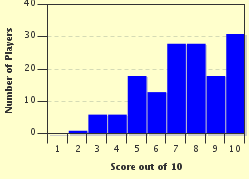Quiz Answer Key and Fun Facts
1. Henry VIII was given the title "Fidei Defensor", or Defender of the Faith, by Pope Leo X in 1521. What had he done to deserve this honor?
2. After tiring of Catherine's inability to produce a male heir, Henry investigated three options, commonly called the "King's Great Matter". Which one of the following was NOT one of the options?
3. By the late 1520s Henry VIII had decided that he wanted his marriage to his ex-sister-in-law annulled. He claimed that his marriage was "blighted in the eyes of God". From which Old Testament book, which is the third one, did he base this claim?
4. Who was the almoner, or chaplain, of King Henry VIII, who also served as Henry's legate to seek an annulment of his marriage to Catherine from the pope?
5. The pope, Clement VII, was willing to allow an annulment of King Henry VIII's marriage to Catherine.
6. The Reformation in England, in the beginning, was more a political movement than a theological one.
7. What happened to Queen Catherine when Henry VIII divorced her and married Ann Boleyn?
8. By what other name was the Church of England known?
9. Which of the following was one of the changes NOT made by Henry VIII during the English Reformation?
10. Henry VIII, by taking over the Church of England and making changes to the English Constitution, ushered in a doctrine that "asserts that a monarch is subject to no earthly authority, deriving the right to rule directly from the will of God." What is the doctrine called?
Source: Author
ponycargirl
This quiz was reviewed by FunTrivia editor
bloomsby before going online.
Any errors found in FunTrivia content are routinely corrected through our feedback system.

